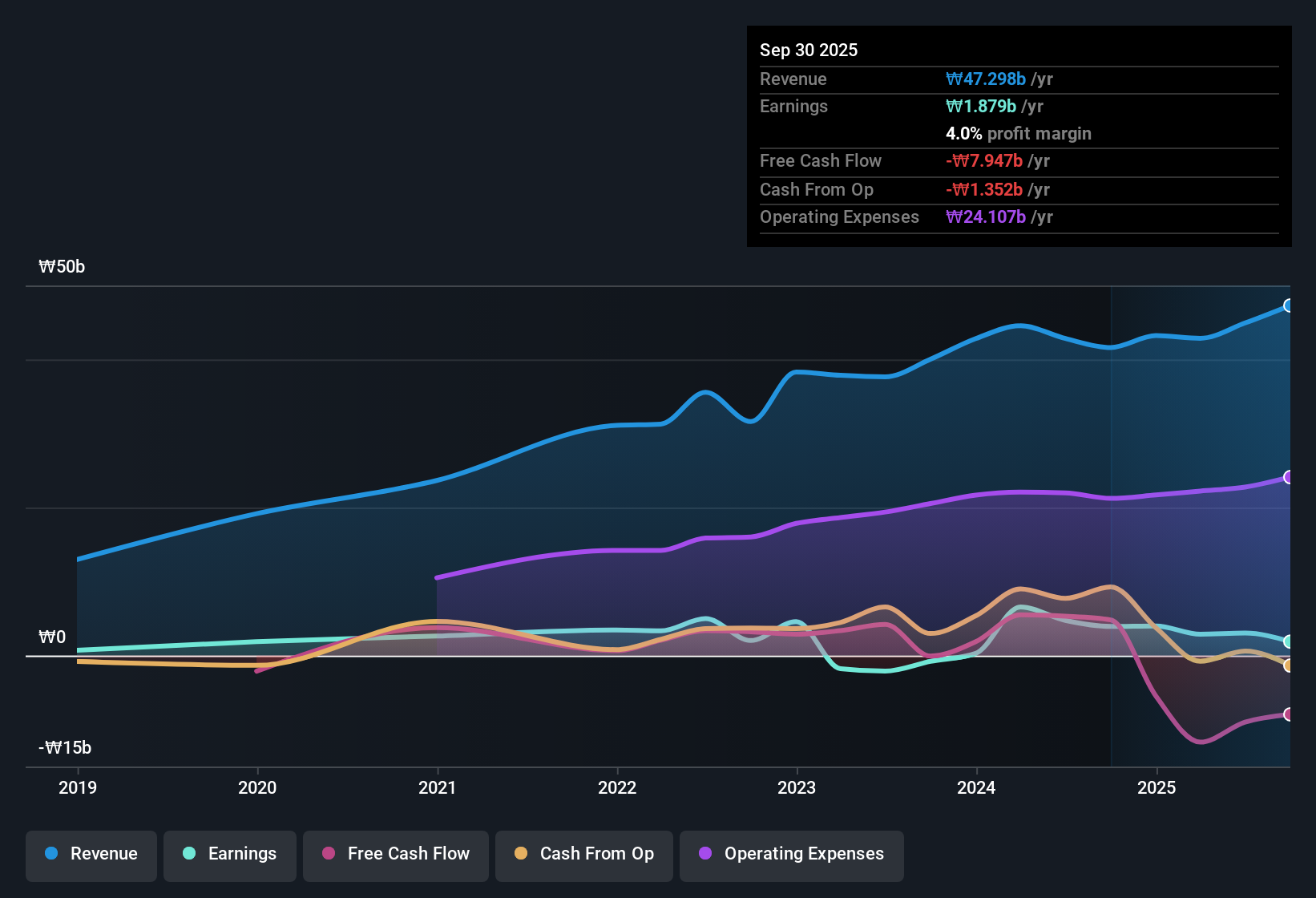- South Korea
- /
- Software
- /
- KOSDAQ:A356680
We Think That There Are More Issues For Axgate (KOSDAQ:356680) Than Just Sluggish Earnings
Last week's earnings announcement from Axgate Co., Ltd. (KOSDAQ:356680) was disappointing to investors, with a sluggish profit figure. Our analysis has found some reasons to be concerned, beyond the weak headline numbers.

Zooming In On Axgate's Earnings
In high finance, the key ratio used to measure how well a company converts reported profits into free cash flow (FCF) is the accrual ratio (from cashflow). In plain english, this ratio subtracts FCF from net profit, and divides that number by the company's average operating assets over that period. You could think of the accrual ratio from cashflow as the 'non-FCF profit ratio'.
Therefore, it's actually considered a good thing when a company has a negative accrual ratio, but a bad thing if its accrual ratio is positive. That is not intended to imply we should worry about a positive accrual ratio, but it's worth noting where the accrual ratio is rather high. To quote a 2014 paper by Lewellen and Resutek, "firms with higher accruals tend to be less profitable in the future".
Axgate has an accrual ratio of 0.34 for the year to September 2025. We can therefore deduce that its free cash flow fell well short of covering its statutory profit, suggesting we might want to think twice before putting a lot of weight on the latter. Even though it reported a profit of ₩1.88b, a look at free cash flow indicates it actually burnt through ₩7.9b in the last year. We saw that FCF was ₩4.8b a year ago though, so Axgate has at least been able to generate positive FCF in the past. The good news for shareholders is that Axgate's accrual ratio was much better last year, so this year's poor reading might simply be a case of a short term mismatch between profit and FCF. Shareholders should look for improved cashflow relative to profit in the current year, if that is indeed the case.
Note: we always recommend investors check balance sheet strength. Click here to be taken to our balance sheet analysis of Axgate.
Our Take On Axgate's Profit Performance
As we have made quite clear, we're a bit worried that Axgate didn't back up the last year's profit with free cashflow. For this reason, we think that Axgate's statutory profits may be a bad guide to its underlying earnings power, and might give investors an overly positive impression of the company. In further bad news, its earnings per share decreased in the last year. Of course, we've only just scratched the surface when it comes to analysing its earnings; one could also consider margins, forecast growth, and return on investment, among other factors. In light of this, if you'd like to do more analysis on the company, it's vital to be informed of the risks involved. For example, we've found that Axgate has 3 warning signs (1 is significant!) that deserve your attention before going any further with your analysis.
Today we've zoomed in on a single data point to better understand the nature of Axgate's profit. But there is always more to discover if you are capable of focussing your mind on minutiae. For example, many people consider a high return on equity as an indication of favorable business economics, while others like to 'follow the money' and search out stocks that insiders are buying. So you may wish to see this free collection of companies boasting high return on equity, or this list of stocks with high insider ownership.
New: Manage All Your Stock Portfolios in One Place
We've created the ultimate portfolio companion for stock investors, and it's free.
• Connect an unlimited number of Portfolios and see your total in one currency
• Be alerted to new Warning Signs or Risks via email or mobile
• Track the Fair Value of your stocks
Have feedback on this article? Concerned about the content? Get in touch with us directly. Alternatively, email editorial-team (at) simplywallst.com.
This article by Simply Wall St is general in nature. We provide commentary based on historical data and analyst forecasts only using an unbiased methodology and our articles are not intended to be financial advice. It does not constitute a recommendation to buy or sell any stock, and does not take account of your objectives, or your financial situation. We aim to bring you long-term focused analysis driven by fundamental data. Note that our analysis may not factor in the latest price-sensitive company announcements or qualitative material. Simply Wall St has no position in any stocks mentioned.
About KOSDAQ:A356680
Axgate
Provides network security solutions and control services for FW, VPN, UTM, TMS, WASM, and WASC.
Adequate balance sheet with low risk.
Market Insights
Community Narratives



